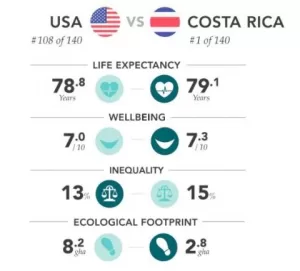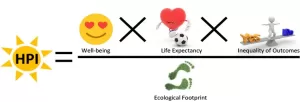Why Costa Rica Leads as the Happiest Country in the World
In the serene dawn hours of Costa Rica, a symphony of nature’s sounds accompanies the start of a new day. Farmers, fishermen, and families rise to embrace the day’s possibilities. The air carries a rare coolness, setting the stage for shared moments over a hearty breakfast of gallo pinto, eggs, sweet plantains, and freshly brewed coffee. This ritual, a labor of love, embodies the essence of Costa Rican life.
In Costa Rica, every mealtime is family time, with home-cooked lunches awaiting children and breadwinners alike. Coffee isn’t just a beverage; it symbolizes community, while work fosters camaraderie, and towns feel like extended families. From work to commuting to household chores, active living defines each waking moment.
Costa Rica’s happiness is not just a feeling; it’s a measurable reality. For the third time in less than a decade, Costa Rica proudly holds the title of the world’s happiest country. This accolade comes from the 2016 Happy Planet Index (HPI), which ranks nations based on experienced well-being, life expectancy, inequality of outcomes, and ecological footprint.
Data from various sources, including the United Nations and Gallup World Poll, contribute to the HPI score. Despite its modest size, Costa Rica’s HPI score of 62.10 surpassed 142 other countries in 2024 index. This achievement underscores Costa Rica’s commitment to sustainable well-being.



Costa Rica’s success story isn’t just about numbers; it’s about the quality of life. Despite ranking 30th globally for life expectancy, Costa Rica’s Nicoya Peninsula boasts one of the world’s five blue zones, where centenarians thrive in health and happiness. This longevity stems from factors like diet, community, and active lifestyles.
At the heart of Costa Rica’s happiness lies its strong sense of community and inclusivity. Family bonds are cherished, and government support ensures access to healthcare, education, and pensions. Even as Costa Ricans critique their government, there’s a sense of security in its commitment to public welfare.
In recent HPI calculations, Costa Rica’s 15% adjustment for inequality of outcomes reflects a growing awareness of social injustices. While the country leads in environmental conservation and renewable energy, there’s room for improvement in reducing ecological footprints.
Costa Rica’s pursuit of happiness extends beyond borders. Despite lower average incomes compared to wealthier nations, Costa Ricans enjoy higher well-being scores. This challenges the notion that wealth equals happiness, highlighting the importance of relationships, experiences, and community support.
In essence, Costa Rica’s happiness is a testament to living consciously, purposefully, and connected to nature and neighbors. By prioritizing basic needs, fostering community ties, and embracing a simpler lifestyle, Costa Rica showcases that happiness isn’t just a goal—it’s a way of life.







